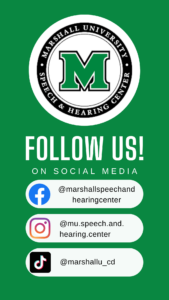The ability to consume food is one most of us take for granted, but for many infants and children, getting the proper nourishment is far from simple. Marshall University’s Pediatric Feeding and Swallowing clinic is a multidisciplinary specialty clinic that provides assessments for infants, children, and adolescents who have difficulty feeding or swallowing. Feeding evaluations and ongoing therapy services are also available for families who are interested in a consultation with the feeding therapist rather than the entire team.
Clinic Objectives
- Foster a positive environment for mealtime
- Improve sucking, chewing, swallowing skills
- Decrease negative behaviors associated with food
- Improve physical, developmental, and nutritional status
- Provide families with real-life support for the implementation of strategies in everyday routines
What can I expect from my first visit to Marshall University’s Pediatric Feeding and Swallowing Clinic?
The professionals on the team believe that mealtime should be a positive experience. With that said, we will have the caregiver present food in the same manner that it was done in the home. We are interested in seeing your typical routine. Each evaluation will be tailored to the individual needs of the child and family. A review of the documentation will occur with a team-based interview. Families will spend time with professionals that are most appropriate for the documented concerns and may include a speech-language pathologist/feeding therapist, dietitian, behavioral psychologist, and physical therapist. The appointment will include a formal oral assessment, nutritional assessment, behavioral/psychological assessment, and a physical therapy assessment with the inclusion of sensory processing. Clinic visits take approximately two hours.
When is the clinic?
Marshall University’s Pediatric Feeding and Swallowing Clinic is typically offered the fourth Tuesday of every month on Marshall University’s Huntington campus in Smith Hall, room 143. Schedules can change due to holidays and providers scheduling conflicts.
What do I need to bring?
- Physician referral
- Medical Information from a primary care physician including previous testing, procedures, growth charts, etc.
- Previous assessment reports and treatment record
- Insurance card
- Any special feeding equipment such as utensils, bottles, cups, or special seating ( e.g. wheelchair) that your child uses
- For physical therapy consult, please bring a photo of your child eating in his normal environment
- Food. Please bring the food that your child usually eats. It is necessary to see them eat their favorite/preferred foods. Please also bring foods you know he/she will refuse. We DO NOT force feed but it is essential in the diagnosis process to observe behaviors when introduced to non-preferred foods
- Beverages that your child prefers and ones that you want them to be drinking along with preferred and nonpreferred cups/bottles
- A three-day diet record
What can I expect after the initial evaluation?
The team will discuss recommendations with you during the visit. It is the hope for the team that each family will leave the assessment with strategies to immediately begin utilizing on a day-to-day basis. An in-depth report containing a complete assessment of recommendations will follow in approximately 2 to 4 weeks. You are encouraged to share the report and recommendations with other professionals.
Ongoing Services/Therapy
Feeding and swallowing therapy is offered on an outpatient basis and is tailored to the specific needs of each child and family. If you have a team close to home, the recommendations and plan of care can be implemented there. Reevaluations can be scheduled as requested.
In the event you live more than 50 miles from the university, you may qualify for Telepractice services. This involves collaborating with a speech-language pathologist online rather than driving to Marshall University.
What are the costs associated with the Pediatric Feeding and Swallowing Clinic?
For evaluation
The evaluation is provided at no cost to families who reside in West Virginia courtesy of the West Virginia Children with Special Needs Program. For those who have insurance, please verify with your carrier to determine the feeding and swallowing services are covered benefits under your policy and if these services need to be pre-authorized.
For those patients without insurance coverage or whose insurance does not cover this evaluation please contact our clinical office manager, Heather Murray, to assist you with any questions you may have 304-696-3641. The fee bill billed to insurance is $325.00
For therapy
Therapy services may be covered by the West Virginia Children with Special Needs Program if the child resides in West Virginia and is enrolled in the program. Other payment options include insurance, prompt pay, and a scholarship program. Insurance does not cover Telepractice at this time therefore patients will be billed $30 for 30 minutes of therapy.

